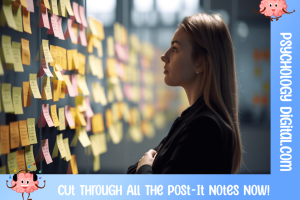
Understanding insight is elusive, and current neurobiological, clinical, and anthropological research offers various viewpoints. Given its ethical and medicolegal implications, psychotherapy professionals must pay special attention to this concept.
Example: If someone does not recognize their family dinner night as being stressful, they will not take steps to change it – this shows a lack of insight.
Understanding the Concept of Insight
“Insight” is when you suddenly understand how to address a problem. This phenomenon is familiar among humans and has numerous examples in science history: Newton with his apple, Archimedes in his bathtub, and Poincare on a bus are just three moments representing insight learning in action (Kohler’s experiment is another such moment). Through insight learning, learners can establish relationships among objects quickly while decreasing the time spent solving a problem.
Wolfgang Kohler (1882-1925) popularized this idea and conducted an experiment whereby he caged Sultan, a chimpanzee. While trying to reach banana bunches outside his cage but failing, Sultan joined two sticks offered by Kohler: one long one out of reach, and the other short within his cell – successfully connecting both together and reaching banana bunches within minutes! This demonstrated insight learning without trial-and-error approaches; once solved, he could use that new cognitive relationship when facing similar issues in future encounters.
“Insight” refers to moments of awareness based on gut feelings or intuition rather than data or evidence, such as when one experiences what’s known as an Aha experience (or eureka moment). Though often positive, these moments may also lead to disappointment or frustration, which prompts Homer Simpson’s catchphrase exclamation, “D’oh!
My experience has taught me that if insight is like water, it only flows over the surface that is made up of your mental health values and preparation. If that surface is measured in up and down swings, the water will never settle to calm.
Personal Identity and Reality Perception
Psychological approaches often suffer from an apparent circularity when explaining personal identity relations regarding psychological concepts. This must have happened if someone recalls an experience or action they performed themselves.
This issue is further complicated because many psychological connections are transitive (e.g., memory). Scholars have attempted to solve this dilemma by proposing that psychological concepts that share all features with ordinary psychological predicates but are transitive are nonjudgmental concerning personal identity.
Don’t fear confronting your understanding of life when you lose insight. I have noticed a massive connection between the similarity of dreams and the time you lose insight. Insight isn’t a personality thing but a malfunction of perfectly working creative thinking ideas.
The Intersection of Insight and Mental Health
The insight literature has failed to address the social experiences associated with mental illness diagnosis adequately. Adopting the identity of someone suffering from mental illness requires more than simply agreeing with doctors and accepting treatment; it also means becoming part of a new group affiliation – comprised of those diagnosed with similar conditions who expect one another to behave in specific ways.
Research has discovered that patients with schizophrenia spectrum disorders who demonstrate poor insight are likelier to experience internalized stigma than those who exhibit good insight (Lysaker et al., 2006). A recent study has linked this phenomenon with the frontal variant of FGTD (bvFTD) and suggests their lack of insight is better described as anosodiaphoria rather than anosognosia; that is, their lack of emotional self-tagging information related to their illness due to disease in their VMPFC-anterior Cingulate-anterior Innia area.
It explains why these patients experience more internalized stigma than others who share the same diagnosis but exhibit greater insight.
You can tell that medical research in counties like the UK with the NHS is behind in an outdated approach. With techniques like NLP, it’s easy to control and stop your symptoms from resurfacing. If you made it this far without medication for something naturally observable, you should avoid it.


